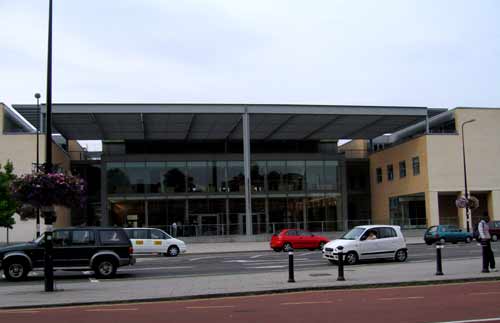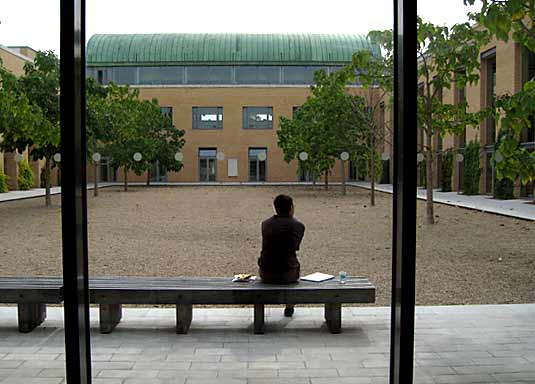The Guardian has an interesting obituary of a “fearless mountaineer who redeemed Austria’s reputation for the sport”. His name? Marcus Schmuck. Think what Jackie Mason would make of that!
Monthly Archives: September 2005
Censorship and news management in New Orleans
It looks to me (and to some US journalists) that there’s now a concerted effort going on to control and limit the amount of free reporting being done in the disaster zone. See, for example, this report by NBC’s Justice Correspondent, Brian Williams:
An interesting dynamic is taking shape in this city, not altogether positive: after days of rampant lawlessness (making for what I think most would agree was an impossible job for the New Orleans Police Department during those first few crucial days of rising water, pitch-black nights and looting of stores) the city has now reached a near-saturation level of military and law enforcement.
In the areas we visited, the red berets of the 82nd Airborne are visible on just about every block. National Guard soldiers are ubiquitous. At one fire scene, I counted law enforcement personnel (who I presume were on hand to guarantee the safety of the firefighters) from four separate jurisdictions, as far away as Connecticut and Illinois.
And tempers are getting hot. While we were attempting to take pictures of the National Guard (a unit from Oklahoma) taking up positions outside a Brooks Brothers on the edge of the Quarter, the sergeant ordered us to the other side of the boulevard. The short version is: there won’t be any pictures of this particular group of Guard soldiers on our newscast tonight. Rules (or I suspect in this case an order on a whim) like those do not HELP the palpable feeling that this area is somehow separate from the United States.
At that same fire scene, a police officer from out of town raised the muzzle of her weapon and aimed it at members of the media… obvious members of the media… armed only with notepads. Her actions (apparently because she thought reporters were encroaching on the scene) were over the top and she was told.
There are automatic weapons and shotguns everywhere you look. It’s a stance that perhaps would have been appropriate during the open lawlessness that has long since ended on most of these streets.
Someone else points out on television as I post this: the fact that the National Guard now bars entry (by journalists) to the very places where people last week were barred from LEAVING (The Convention Center and Superdome) is a kind of perverse and perfectly backward postscript to this awful chapter in American history.
So, has he been fired or not?
According to CNN,
WASHINGTON — Coast Guard Vice Adm. Thad Allen will replace FEMA director Michael Brown as the on-site head of hurricane relief operations in the Gulf Coast, Homeland Security Secretary Michael Chertoff announced Friday afternoon. Brown will head back to Washington from Louisiana to oversee the big picture, the official said.
I have this image of Brown painting the ‘big picture’ by numbers.
Nano, mano, schano
Er, Apple launched its
Pastel abstract

Common Room, Said Business School, Oxford, September 9, 2005.
Network? What network?
Just back from Oxford, where I chaired a session of the Internet Institute’s conference on ‘Safety and Security in a Networked World. The conference was held in Oxford’s Said Business School, a grim building near the railway station which looks like the headquarters of a dry-cleaning company.

It would be nice to think that the School is named after Edward Said, the late — and distinguished — Palestinian cultural critic, but I fear the money that built it is more likely to have come from commissions on oil and arms sales. In a feeble attempt to give the place a vaguely middle-Eastern air, it’s built around a featureless courtyard.

When I arrived, I asked the pleasant young woman at the desk how to log onto the wireless network. She gave me a nice-but-puzzled look. Her voice said that there wasn’t such a thing; her look said “This is a business school, dumbo, not some technology college”. So I launched MacStumbler and — Lo! — it was So! The University of Oxford’s Business School doesn’t have a single wireless network.
The panellists on my session (on ‘Privacy, Trust & Security – A Zero-Sum Game?’) were an interesting lot: Caspar Bowden, who was an imaginative Director of FIPR before he joined Microsoft as their Chief Privacy Adviser; Fred Piper of London University; Elizabeth France, the Telecommunications Ombudsman; Richard Starnes; and — to my great delight — Eli Noam from Columbia, one of the most stimulating and unsettling academics in the field of telecommunications policy. It turns out that he’s on the Advisory Board of the Oxford Internet Institute.
And lest we get too complacent…
… see this column by Polly Toynbee in today’s Guardian. Sample:
Before we get too piously smug about America, just imagine a flood crashing through the Thames barrier and drowning London and Essex. What would we see? Essentially the same thing, even if mayor Ken Livingstone did evacuation well. The middle classes would escape to friends and relatives. The poor who have no networks beyond other poor people would collect in camps. They would be as pitifully helpless and there would be millions of them too. In New Orleans people couldn’t get away for lack of the price of a taxi out of town. In London too, floods would expose what is hidden to well-off Britain because we also live strictly segregated lives. Housing-estate ghettoes are never entered by the 75% homeowners, places hidden even in the next street.
Poor London victims would also have nothing more than the clothes they stood in. Nationally 27% of people have no savings, not one penny; 25% of the poorest have at least £200 in debts, which would track them down to their refugee camps; 12% of households (many more individuals) have no bank account – even for those with basic accounts, banks never lend so much as a bus fare to those who most need it. A quarter of households have no insurance; they would lose everything.
Quote of the day
If 9/11 is one bookend of the Bush administration, Katrina may be the other. If 9/11 put the wind at President Bush’s back, Katrina’s put the wind in his face. If the Bush-Cheney team seemed to be the right guys to deal with Osama, they seem exactly the wrong guys to deal with Katrina – and all the rot and misplaced priorities it’s exposed here at home.
These are people so much better at inflicting pain than feeling it, so much better at taking things apart than putting them together, so much better at defending “intelligent design” as a theology than practicing it as a policy.
Thomas Friedman, writing in the New York Times.
Katrina’s Silver Lining
Interesting NYT column by David Brooks. Excerpt:
It has created as close to a blank slate as we get in human affairs, and given us a chance to rebuild a city that wasn’t working. We need to be realistic about how much we can actually change human behavior, but it would be a double tragedy if we didn’t take advantage of these unique circumstances to do something that could serve as a spur to antipoverty programs nationwide.
The first rule of the rebuilding effort should be: Nothing Like Before. Most of the ambitious and organized people abandoned the inner-city areas of New Orleans long ago, leaving neighborhoods where roughly three-quarters of the people were poor.
In those cultural zones, many people dropped out of high school, so it seemed normal to drop out of high school. Many teenage girls had babies, so it seemed normal to become a teenage mother. It was hard for men to get stable jobs, so it was not abnormal for them to commit crimes and hop from one relationship to another. Many people lacked marketable social skills, so it was hard for young people to learn these skills from parents, neighbors and peers.
If we just put up new buildings and allow the same people to move back into their old neighborhoods, then urban New Orleans will become just as rundown and dysfunctional as before.
Reconstruction on the cheap
Well, well. This from a CNN report dated September 8:
President Bush issued an executive order Thursday allowing federal contractors rebuilding in the aftermath of Hurricane Katrina to pay below the prevailing wage.
In a notice to Congress, Bush said the hurricane had caused “a national emergency” that permits him to take such action under the 1931 Davis-Bacon Act in ravaged areas of Alabama, Florida, Louisiana and Mississippi.
Bush’s action came as the federal government moved to provide billions of dollars in aid, and drew rebukes from two of organized labor’s biggest friends in Congress, Rep. George Miller of California and Sen. Edward Kennedy of Massachusetts, both Democrats.
“The administration is using the devastation of Hurricane Katrina to cut the wages of people desperately trying to rebuild their lives and their communities,” Miller said.
There’s a silver lining in every dark cloud — for Halliburton at least. Thanks to CD for the link.
